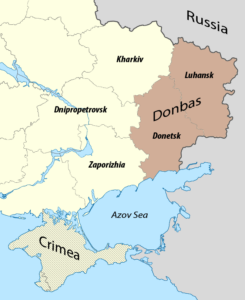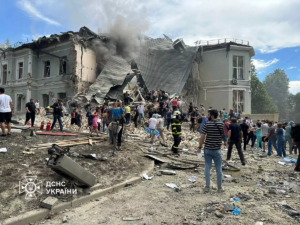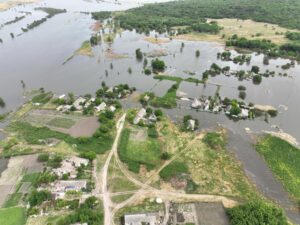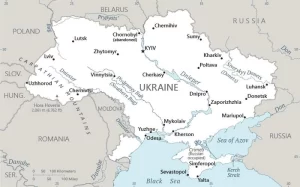Ukraine
What
In February 2022, the Russian Federation launched a full-scale invasion of Ukraine. Russian authorities and armed forces are accused of perpetrating genocide, ecocide, crimes against humanity, and war crimes, including torture, rape, summary executions, indiscriminate attacks against civilian targets, and forcible deportation of Ukrainians to Russian-controlled territories.
Where
Ukraine is in Eastern Europe and shares a border with Russia, Belarus, Poland, Slovakia, Hungary, Romania, and Moldova. It has a population of about 35 million people.[1] Ukraine was part of the Russian Empire, had a brief period of independence following the Empire’s collapse, and then was absorbed into the newly formed Soviet Union, before again becoming independent in 1991 when the Soviet Union collapsed.[2]
Russian political figures, including current president Vladimir Putin, have long maintained that Ukraine has always been part of Russia and holds no independent history of its own.[3] Russia thus views any movement of Ukraine away from Russian influence as a threat to Russia’s legitimate control of Ukraine.[4]

Map of eastern Ukraine with Donbas and Crimea highlighted. Image courtesy of RGloucester is unmodified and licensed under CC BY-SA 3.0.
When
A series of mass uprisings led to the fall of a pro-Russian Ukrainian government in 2014.[5] Russia responded by invading and annexing the Crimean Peninsula in southern Ukraine.[6] Later that year, conflict broke out between Ukrainian forces and Russian-backed militias in the Ukrainian provinces of Donetsk and Luhansk in the Donbas region.[7] These events increased Russia’s pressure over Ukraine, and, indeed, over other former Soviet republics.[8]
Ukraine increasingly moved toward Western powers politically after losing Crimea, and in 2018, codified its desire to join NATO into the Ukrainian constitution.[9] Russia began amassing troops near the Ukrainian border in 2021 and threatened further action if NATO inducted Ukraine, which would put a powerful Western presence on Russia’s border.[10]
In February 2022, Russia recognized Donetsk and Luhansk as independent states and invaded Ukraine, turning the Donbas conflict into a wider war. [11] Putin claimed the offensive was done to protect ethnic Russians in Ukraine’s east and to “de-nazify” the nation. [12]
How
Genocide
Rhetoric from Putin, Russian officials, and Russian state media indicates a clear intent to erase Ukrainian nationality, sovereignty, and cultural identity.[14]

Russian forces bombed buildings of the children’s hospital in Okhmatdyt, Kyiv, July 2024. Image courtesy of attribute dsns.gov.ua is unmodified and licensed under CC BY 4.0.
Russian forces target Ukrainian civilians, including women, children, and the elderly.[15] As of October 2024, at least 12,162 civilians, including 659 children, have been killed in Ukraine.[15] Putin’s forces have attacked Ukraine’s civilian infrastructure, depriving residents of essentials like food, water, medicine, and education.[16] They have bombed hospitals, preventing births and causing patient deaths, and targeted Ukraine’s energy installations, leading to widespread damage that threatens needed services like sanitation, heating, and healthcare.[17]
Russia transferred over 20,000 Ukrainian children to areas under its control and forcibly adopted them into Russian families.[18] This violates the 1948 Genocide Convention. Russia suppresses Ukrainian linguistic and cultural expression and mandates Russian education in occupied parts of Ukraine.[19]
Russian forces have destroyed Ukrainian cultural sites. In 2025, UNESCO verified that 476 cultural properties have been damaged in the war, including religious buildings, museums, and libraries.[20] Ukraine’s government reports that almost 1,000 sites have been destroyed, alongside 2,000 cultural institutions harmed.[21]
War Crimes
All parties to the armed conflict in Ukraine must follow international humanitarian law, or the laws of war, which prohibit willful killing, rape, torture, and inhumane treatment of prisoners of war (POWs) and civilians. Observers have documented widespread violations of international humanitarian law by Russian forces, including:
- Russian forces have indiscriminately attacked civilian targets such as residential areas, hospitals, and schools.[22]
- Russian forces have used cluster munitions, which release explosives over a wide area. They may fail to explode upon impact and turn into land mines, posing a long-term danger to civilians.[23]
- In the Kyiv suburb of Bucha, hundreds of bodies and several mass graves were found after Russian forces withdrew in early 2022. Subsequent investigations revealed that Russian troops reportedly killed hundreds of people and raped 25 girls and women during their occupation of Bucha.[24]
- Russian forces have allegedly used Ukrainian civilians, including children, as human shields.[25]
- Russian forces have forcibly disappeared thousands of Ukrainians.[26]

Flooding in Kherson Oblast the destruction of the Kakhovka Dam, June 2023. Image courtesy of Dsns.gov.ua is unmodified and licensed under CC BY 4.0.
Ecocide
Ecocide means to destroy the environment. In 2023, the Kakhovka Dam, then under the control of the Russian military, was bombed.[27] Destruction of the dam caused severe flooding, ecosystem damage, destruction of wildlife, loss of agricultural land, water scarcity, and water pollution, and put the affected area at increased risk of desertification.[28] The flooding cut 700,000 people from their water supply and displaced 3,000 people.[29]
Estimates in 2024 found that Russia has caused over $60 billion in environmental damage in Ukraine, with concerns growing that these harms have put Ukraine on the edge of ecological collapse.[30]
Response
International Courts
International Court of Justice (ICJ): Almost immediately after Russia invaded Ukraine, Ukraine filed a case at the International Court of Justice. This court hears cases between countries about treaty disputes. Ukraine charged Russia with violating the 1948 Genocide Convention, which both countries have ratified.[31] Russia justified its invasion of Ukraine by claiming Ukraine was enacting genocide against ethnic Russians in the Donbas region.[32] In 2024, the ICJ decided that it could determine whether Ukraine committed genocide within the Donbas region—and will in the future—but also held that even if Russia inaccurately invoked the crime to justify conflict, the court lacked the ability to label that a Convention violation.[33] Most commentators deemed the decision a loss for Ukraine.[34]
International Criminal Court (ICC): The ICC has been investigating crimes in Ukraine since March 2022, a week after Russia’s invasion.[35] In 2023, the ICC issued arrest warrants for Russian President Putin and Commissioner for Children’s Rights Maria Lvova-Belova for perpetrating war crimes in Ukraine and unlawfully abducting and deporting thousands of children from occupied areas of Ukraine to Russia.[36] Putin traveled to Mongolia, a state party to the ICC, in 2024. All state parties are responsible for detaining any individual with an active warrant who enters their borders. Mongolia took no action against Putin during his visit, likely because of Mongolia’s strong reliance on Russian energy.[37]
In 2024, the ICC issued four additional arrest warrants for Russian government officials allegedly complicit in war crimes against Ukrainian civilians.[38] Ukraine also ratified the Rome Statute that year, becoming the court’s 125th state party.[39]
Regional Courts and Mechanisms
Ukraine brought a case against Russia to the European Court of Human Rights (ECtHR). In January 2023, this Court ruled the dispute admissible, holding that Russia held effective control over Ukraine’s annexed east.[40] In 2024, the ECtHR found Russia guilty of multiple human rights abuses against ethnic Ukrainians, Crimean Tatars, and political dissidents in Crimea, which allowed persecuted persons from Crimea to pursue individual cases against the state.[41]
The EU Agency for Criminal Justice Cooperation has set up Joint Investigation Teams with Ukraine and several other countries to facilitate cooperation on war crimes investigations there.[42] In 2023, the EU also established the International Centre for the Prosecution of Crimes of Aggression against Ukraine to investigate claims of the crime of aggression raised by Russia’s invasion.[43]
National Courts
In Ukraine: Three months after Russia’s invasion, Ukrainian courts delivered their first convictions for war crimes committed by Russian soldiers. In late 2024, Ukrainian prosecutors were pursuing over 135,000 war crime cases against the Russian army.[44]
Universal Jurisdiction: Universal jurisdiction allows crimes that are especially heinous to be prosecuted anywhere in the world. National courts in fifteen European countries have opened investigations into Russian war crimes under universal jurisdiction.[45] Individuals within other nations, including Argentina, have used universal jurisdiction to file cases against Russia in domestic courts. In 2023, the United States indicted four Russian military officials for war crimes in Ukraine using a domestic statute rooted in universal jurisdiction principles.[46]
In December 2022, the U.S. Congress unanimously passed the Justice for Victims of War Crimes Act, which enables alleged war criminals who attempt to hide in safety in the US to be prosecuted regardless of the nationality of the perpetrator, the victim, or where the crime occurred, with no statute of limitation.[47]
Political Response
In 2022, the UN General Assembly (UNGA) passed a resolution condemning Russia’s military operations in Ukraine and demanding a withdrawal of Russian forces.[48] In 2023, the UNGA passed a second resolution denouncing Russia’s invasion of Ukraine, and in 2024, the United Nations Human Rights Council adopted a resolution criticizing human rights abuses in Ukraine caused by Russian aggression.[49]
The US, the UK, the EU, and several other countries have imposed economic sanctions on Russia following its annexation of Crimea and incursion into eastern Ukraine.[51] Many countries, including the US and the 27 EU member states, have also imposed sanctions on Russian industry.[52] More than 1,000 international companies have withdrawn from operating in Russia and Western nations froze over $300 billion in Russian assets.[53] However, these measures have not been widespread or deep enough to provide significant economic harm to the Russian economy, which has many other trading partners and benefits from the exploitation of gold and other minerals from several African countries.
The war altered the European security landscape and compelled historically neutral countries, notably Sweden and Finland, to join NATO.[54] The EU has committed €140 billion to Ukraine since the war began, with a commitment of an additional €54 billion through 2027.[55] Since 2022, the US has provided over $175 billion in aid to the country. The Biden Administration announced its final weapons package for Ukraine in January 2025.[56]
Future
Concern for human rights abuses continues, including the condition of prisons in Russia, specifically in the torture of Ukrainian prisoners of war (POW). UN reports have found that Russia systematically abuses Ukrainian POWs, including through sexual violence. [57]
Through the Uniting for Ukraine program, over 187,000 Ukrainians have been resettled in the United States.[58] The Ukrainian Mothers and Children Transport (UMACT) is another organization that helps Ukrainian families secure travel visas to the United States.[59] The Department of Homeland Security has extended Temporary Protected Status (TPS) for Ukrainian nationals with TPS through October 2026.[50]
Over 4 million Ukrainians are internally displaced, and an additional 6.4 million refugees have left the country. Internally displaced people and refugee groups make up 17% of Ukraine’s total pre-war population. The UNHCR reported that 14.6 million Ukrainians (39%) needed humanitarian aid in 2024.[60]
As of January 2025, over 1,000,000 troops from all sides have died or been injured in combat.[61] This number increases daily.[62]
This page was updated by Bekir Hodzic and Evelyn Middleton, January 2025.
References
[1] Central Intelligence Agency. (2025, January 18). Ukraine. The World Factbook. https://www.cia.gov/the-world-factbook/countries/ukraine/
[2] Central Intelligence Agency. (2025, January 18). Ukraine. The World Factbook. https://www.cia.gov/the-world-factbook/countries/ukraine/
[3] Reid, A. (2022, April 6). Putin’s War on History: The Thousand-Year Struggle Over Ukraine. Foreign Affairs. https://www.foreignaffairs.com/articles/ukraine/2022-04-06/putins-war-history-ukraine-russia
[4] Reid, A. (2022, April 6). Putin’s War on History: The Thousand-Year Struggle Over Ukraine. Foreign Affairs. https://www.foreignaffairs.com/articles/ukraine/2022-04-06/putins-war-history-ukraine-russia
[5] Pifer, S. (2020, February 21). Ukraine: Six years after the Maidan. Brookings. https://www.brookings.edu/articles/ukraine-six-years-after-the-maidan/; Profile: Ukraine’s ousted President Viktor Yanukovych. (2014, February 28). BBC News. https://www.bbc.com/news/world-europe-25182830
[6] Myers, S. L. (2014, March 18). Putin Reclaims Crimea for Russia and Bitterly Denounces the West. The New York Times. https://www.nytimes.com/2014/03/19/world/europe/ukraine.html
[7] Hernandex, J. (2022, February 22). Why Luhansk and Donetsk are key to understanding the latest escalation in Ukraine. NPR. https://www.npr.org/2022/02/22/1082345068/why-luhansk-and-donetsk-are-key-to-understanding-the-latest-escalation-in-ukrain
[8] Temnycky, M. (2023, April 25). Putin’s dreams of a new Russian Empire are unraveling in Ukraine. Atlantic Council. https://www.atlanticcouncil.org/blogs/ukrainealert/putins-dreams-of-a-new-russian-empire-are-unraveling-in-ukraine/
[9] RFE/RL. (2019, February 19). Ukraine President Signs Constitutional Amendment On NATO, EU Membership. Radio Free Europe/Radio Liberty. https://www.rferl.org/a/ukraine-president-signs-constitutional-amendment-on-nato-eu-membership/29779430.html
[10] Harris, S. & Sonne, P. (2021, December 3). Russia planning massive military offensive against Ukraine involving 175,000 troops, U.S. intelligence warns. The Washington Post. https://www.washingtonpost.com/national-security/russia-ukraine-invasion/2021/12/03/98a3760e-546b-11ec-8769-2f4ecdf7a2ad_story.html; Roth, A. (2021, December 17). Russia issues list of demands it says must be met to lower tensions in Europe. The Guardian. https://www.theguardian.com/world/2021/dec/17/russia-issues-list-demands-tensions-europe-ukraine-nato
[11] Isachenkov, V., Karmanau, Y. & Cook, L. (2022, February 21). Putin recognizes separatist eastern Ukrainian regions, paving the way for military support. PBS News. https://www.pbs.org/newshour/politics/putin-recognizes-separatist-eastern-ukrainian-regions-paving-the-way-for-military-support; Leonhardt, D. (2022, February 24). War in Ukraine. The New York Times. https://www.nytimes.com/2022/02/24/briefing/ukraine-russia-invasion-putin.html
[12] Treisman, R. (2022, March 1). Putin’s claim of fighting against Ukraine ‘neo-Nazis’ distorts history, scholars say. NPR. https://www.npr.org/2022/03/01/1083677765/putin-denazify-ukraine-russia-history
[13] Apt, C. (2024, August 26). Russia’s Eliminationist Rhetoric Against Ukraine: A Collection. Just Security. https://www.justsecurity.org/81789/russias-eliminationist-rhetoric-against-ukraine-a-collection/
[14] Bílková, V., Hellestveit, C. & Šteinerte, E. (2024, April 25). Report on violations and abuses of international humanitarian and human rights law, war crimes and crimes against humanity, related to the arbitrary deprivation of liberty of Ukrainian civilians by the Russian Federation. Organization for Security and Co-operation in Europe. https://www.osce.org/odihr/567367
[15] Ukraine: Protection of civilians in armed conflict, October 2024 update. (2024, November 15). Office of the United Nations High Commissioner for Human Rights. https://ukraine.un.org/sites/default/files/2024-11/Ukraine%20-%20protection%20of%20civilians%20in%20armed%20conflict%20%28October%202024%29_ENG.pdf
[16] Reuters. (2024, October 10). Russia hits civilian, critical infrastructure, injures 10 in Ukraine. Reuters. https://www.reuters.com/world/europe/russian-strikes-injure-four-people-ukraines-zaporizhzhia-2024-10-10/; Human Rights Watch. (2023, November 9). “Tanks on the Playground”: Attacks on Schools and Military Use of Schools in Ukraine. Human Rights Watch. https://www.hrw.org/report/2023/11/09/tanks-playground/attacks-schools-and-military-use-schools-ukraine
[17] Physicians for Human Rights & Truth Hounds. (2024, December 4). Health Care in the Dark: The Impacts of Russian Attacks on Energy in Ukraine. Physicians for Human Rights. https://phr.org/our-work/resources/health-care-in-the-dark-attacks-on-energy-in-ukraine/
[18] Revill, J. (2024, June 15). Ukrainian children abducted by Russia left with psychological scars, campaigners say. Reuters. https://www.reuters.com/world/europe/ukrainian-children-abducted-by-russia-left-with-psychological-scars-campaigners-2024-06-15/
[19] Human Rights Watch. (2024, June 20). Education under Occupation: Forced Russification of the School System in Occupied Ukrainian Territories. Human Rights Watch. https://www.hrw.org/report/2024/06/20/education-under-occupation/forced-russification-school-system-occupied-ukrainian
[20] Damaged cultural sites in Ukraine verified by UNESCO. (2024, February 8). UNESCO. https://www.unesco.org/en/articles/damaged-cultural-sites-ukraine-verified-unesco
[21] Destruction of cultural heritage in Ukraine. (2024, October 16). Council of Europe. https://www.coe.int/en/web/congress/-/destruction-of-cultural-heritage-in-ukraine
[22] Russian military commits indiscriminate attacks during the invasion of Ukraine. (2022, February 25). Amnesty International. https://www.amnesty.org/en/latest/news/2022/02/russian-military-commits-indiscriminate-attacks-during-the-invasion-of-ukraine/
[23] Cluster Munition Use in Russia-Ukraine War. (2023, May 29). Human Rights Watch. https://www.hrw.org/news/2023/05/29/cluster-munition-use-russia-ukraine-war
[24] Al-Hlou, Y., Froliak, M., Khavin, D., Koettl, C., Willis, H., Cardia, A., Reneau, N. & Browne, M. (2022, December 22). Caught on Camera, Traced by Phone: The Russian Military Unit That Killed Dozens in Bucha. https://www.nytimes.com/2022/12/22/video/russia-ukraine-bucha-massacre-takeaways.html; Weber, P. Russian troops ‘systematically raped’ 25 women, girls as young as 14 in a Bucha basement, Ukraine says. The Week. https://theweek.com/russo-ukrainian-war/1012441/russian-troops-systematically-raped-25-women-girls-as-young-as-14-in-a
[25] Knight, M. & Lou, C. (2024, May 18). Russian forces use border-town captives as ‘human shields,’ Ukrainian officials say. CNN. https://www.cnn.com/2024/05/17/europe/russia-ukrainian-captives-human-shields-intl-hnk/index.html
[26] Rainsford, S. (2024, February 30). The search for Ukraine’s missing – ‘no one could have foreseen this nightmare’. BBC. https://www.bbc.com/news/articles/c74m1l2y7lko; Russia: Forcible Disappearances of Ukrainian Civilians. (2022, July 14). Human Rights Watch. https://www.hrw.org/news/2022/07/14/russia-forcible-disappearances-ukrainian-civilians
[27] Glanz, J., Santora, M., Robles, P., Willis, H., Leatherby, L., Koettl, C., & Khavin, D. (2023, June 16). Why the Evidence Suggests Russia Blew Up the Kakhovka Dam. The New York Times. https://www.nytimes.com/interactive/2023/06/16/world/europe/ukraine-kakhovka-dam-collapse.html
[28] Truth Hounds & Project Expedite Justice. (2024, June 6). Submerged: Study of the Destruction of the Kakhovka Dam and Its Impacts on Ecosystems, Agrarians, Other Civilians, and International Justice. Truth Hounds. https://truth-hounds.org/en/cases/submerged-study-of-the-destruction-of-the-kakhovka-dam-and-its-impacts-on-ecosystems-agrarians-other-civilians-and-international-justice/
[29] Ukraine: 700,000 people affected by water shortages from dam disaster. (2023, June 16). United Nations. https://news.un.org/en/story/2023/06/1137797; 100 days since Kakhovka dam disaster: People facing water shortages, housing woes and blackout fears. (2023, September 13). Norwegian Refugee Council. https://www.nrc.no/news/2023/september/ukraine-dam-explosion
[30] After Two Years of War, Ukraine Sees Deepening Environmental Wound. (2024, February 23). Yale Environment 360. https://e360.yale.edu/digest/ukraine-war-environment-2024
[31] Milanovic, M. (2024, February 2). ICJ Delivers Preliminary Objections Judgment in the Ukraine v. Russia Genocide Case, Ukraine Loses on the Most Important Aspects. EJIL: Talk! https://www.ejiltalk.org/icj-delivers-preliminary-objections-judgment-in-the-ukraine-v-russia-genocide-case-ukraine-loses-on-the-most-important-aspects/
[32] Hathaway, O. A. (2024, February 5). Taking Stock of ICJ Decisions in the ‘Ukraine v. Russia’ Cases—And implications for South Africa’s case against Israel. Just Security. https://www.justsecurity.org/91781/taking-stock-of-icj-decisions-in-ukraine-v-russia-cases-and-implications-for-south-africas-case-against-israel/
[33] Hathaway, O. A. (2024, February 5). Taking Stock of ICJ Decisions in the ‘Ukraine v. Russia’ Cases—And implications for South Africa’s case against Israel. Just Security. https://www.justsecurity.org/91781/taking-stock-of-icj-decisions-in-ukraine-v-russia-cases-and-implications-for-south-africas-case-against-israel/
[34] Milanovic, M. (2024, February 2). ICJ Delivers Preliminary Objections Judgment in the Ukraine v. Russia Genocide Case, Ukraine Loses on the Most Important Aspects. EJIL: Talk! https://www.ejiltalk.org/icj-delivers-preliminary-objections-judgment-in-the-ukraine-v-russia-genocide-case-ukraine-loses-on-the-most-important-aspects/
[35] Al Jazeera. (2022, March 2). ICC to begin investigation into possible war crimes in Ukraine. Al Jazeera. https://www.aljazeera.com/news/2022/3/2/icc-to-begin-investigation-into-possible-war-crimes-in-ukraine
[36] Situation in Ukraine: ICC judges issue arrest warrants against Vladimir Vladimirovich Putin and Maria Alekseyevna Lvova-Belova. (2023, March 17). International Criminal Court. https://www.icc-cpi.int/news/situation-ukraine-icc-judges-issue-arrest-warrants-against-vladimir-vladimirovich-putin-and
[37] Green, R. (2024, September 30). Ukraine-Russia: Putin’s visit to Mongolia defies ICC arrest warrant as the world looks on. International Bar Association. https://www.ibanet.org/putin-visit-to-mongolia-defies-icc-arrest-warrant-as-world-looks-on; Ukraine situation: ICC Pre-Trial Chamber II finds that Mongolia failed to cooperate in the arrest and surrender of Vladimir Vladimirovich Putin and refers the matter to the Assembly of States Parties. (2024, October 24). International Criminal Court. https://www.icc-cpi.int/news/ukraine-situation-icc-pre-trial-chamber-ii-finds-mongolia-failed-cooperate-arrest-and
[38] Wright, G. (2024, March 5). ICC issues arrest warrants for top Russian commanders. BBC. https://www.bbc.com/news/world-europe-68483012; Gorbunova, Y. (2024, June 26). New ICC Warrants Issued for Ukraine Crimes. Human Rights Watch. https://www.hrw.org/news/2024/06/26/new-icc-warrants-issued-ukraine-crimes
[39] ICC welcomes Ukraine as a new State Party. (2025, January 2). International Criminal Court. https://www.icc-cpi.int/news/icc-welcomes-ukraine-new-state-party
[40] European Court of Human Rights. (2023, January). Ukraine and Netherlands v. Russia – Case Admissibility Decision. ECtHR. https://hudoc.echr.coe.int/eng?i=002-13989
[41] Romanenko, Valentyna. (2023, July 18). Ukraine beats Russia in European Court of Human Rights case filed by Moscow. European Pravada. https://www.pravda.com.ua/eng/news/2023/07/18/7411807/
[42] Eurojust. (2023). Joint Investigation Team for Alleged Crimes Committed in Ukraine. European Union Agency for Criminal Justice Cooperation. https://www.eurojust.europa.eu/joint-investigation-team-alleged-crimes-committed-ukraine
[43] European Union (2023, July 3). Ukraine: International Centre for the prosecution of Russia’s crimes of aggression against Ukraine start operations. European Union. https://enlargement.ec.europa.eu/news/ukraine-international-centre-prosecution-russias-crime-aggression-against-ukraine-starts-operations-2023-07-03_en
[44] Reuters. (2024, February 23). Ukraine probing over 122,000 suspected war crimes, say prosecutors. Reuters. https://www.reuters.com/world/europe/ukraine-probing-over-122000-suspected-war-crimes-says-prosecutor-2024-02-23/
[45] Jourdan, Adam & Van Den Berg, Stephanie. (2024, April 16). Exclusive: Ukraine man’s torture case against Russians seeks justice in Argentina. Reuters. https://www.reuters.com/world/ukraine-mans-torture-case-against-russians-seeks-justice-argentina-2024-04-16/
[46] CEELI Institute. (2024, October 29). Universal Jurisdiction as a Tool for Justice and Accountability in Ukraine and Beyond. CEELI Institute. https://ceeliinstitute.org/news/universal-jurisdiction-as-a-tool-for-justice-and-accountability-in-ukraine-and-beyond
[47] U.S. Congress. (2022, December). Justice for Victims of War Crimes Act Passes Unanimously. U.S. Government.
[48] U.S. Citizenship and Immigration Services. (2025, January 10). Temporary Protected Status Designated Country: Ukraine. U.S. Citizenship and Immigration Services. https://www.uscis.gov/humanitarian/temporary-protected-status/TPS-Ukraine
[49] United Nations General Assembly. (2022). Resolution Condemning Russia’s Military Operations in Ukraine. United Nations.
[50] United Nations Human Rights Council. (2024). Resolution Criticizing Human Rights Abuses in Ukraine. United Nations.
[51] United Nations General Assembly. (2023). Resolution Denouncing Russia’s Invasion of Ukraine. United Nations.
[52] Berman, Noah. (2024, February 23). Two Years of War in Ukraine: Are Sanctions Against Russia Making a Difference? Council on Foreign Relations. https://www.cfr.org/in-brief/two-years-war-ukraine-are-sanctions-against-russia-making-difference?gad_source=1&gclid=CjwKCAiA74G9BhAEEiwA8kNfpVZsKi1OIxx7yU8kD_WIjkljtATfCVtUn-5KmT5JyKdZg388m_pLNxoCEo4QAvD_BwE
[53] Parodi, Alessandro & Marrow, Alexander. (2023). Foreign firms’ losses from exiting Russia top $107 billion. Reuters. https://www.reuters.com/markets/europe/foreign-firms-losses-exiting-russia-top-107-billion-2024-03-28/
[54] NATO. (2024). Sweden and Finland Join NATO in Response to Russia’s Actions. North Atlantic Treaty Organization.
[55] European Union. (2025, January 15). EU Assistance to Ukraine (in U.S. Dollars). European Union. https://www.eeas.europa.eu/delegations/united-states-america/eu-assistance-ukraine-us-dollars_en?s=253
[56] U.S. Department of State. (2025, January). Final U.S. Weapons Package for Ukraine Announced by Biden Administration.
[57] United Nations. (2024). UN Reports Document Systematic Abuse of Ukrainian POWs by Russia. United Nations Human Rights Office.
[58] U.S. Department of Homeland Security. (2024). Uniting for Ukraine Program: Over 187,000 Ukrainians Resettled in the United States. U.S. Department of Homeland Security
[59] Ukrainian Mothers and Children Transport. (2022). What We Do. UMACT https://umactransport.org/what-we-do
[60] UNHCR. (2024). 14.6 million Ukrainians Require Humanitarian Aid in 2024. United Nations High Commissioner for Refugees.
[61] Pancevski, B. (2024, September 17). One Million Are Now Dead or Injured in the Russia-Ukraine War. The Wall Street Journal. https://www.wsj.com/world/one-million-are-now-dead-or-injured-in-the-russia-ukraine-war-b09d04e5
[62] Schmitt, E. (2024, October 10). September Was Deadly Month for Russian Troops in Ukraine, U.S. Says. The New York Times. https://www.nytimes.com/2024/10/10/us/politics/russia-casualties-ukraine-war.html



